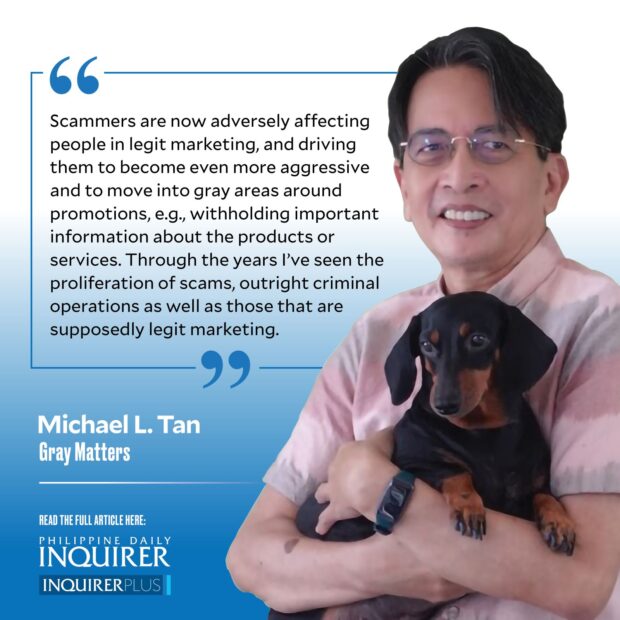Scamming, marketing

The National Telecommunications Commission, facing criticism from senators for the sloppy implementation of the SIM Registration Act, has pleaded to the public to understand that SIM card registration is not a “silver bullet,” a rather appropriate metaphor since silver bullets were supposedly effective against vampires, and really, the scammers are the worst kind of vampires in modern society.
The problems are really much more deeply rooted because there’s a gray line now separating hard-sell and outright scams. As early as high school young students are encouraged to become influencers and marketers all under the name of “marketing.”
Drive through Edsa, walk through a mall and you’re bombarded with misinformation on the larger-than-life ads. Think, too, of the barrage of calls you get, many even from legitimate companies like banks and PLDT offering all kinds of special deals on subscriptions, gadgets, credit cards.
Article continues after this advertisementLast week I did give time to one caller offering one of those hotel deals where you pay a “membership fee” (that’s designed to make you feel it’s a privilege) where you can avail of, within a year, discounts on rooms and dining, with some little (cheap) perks like a birthday cake. Agents tend to be hard-sell but are generally benign and I thought about how, as a “retired” administrator in University of the Philippines, I find myself even busier with projects and rarely take out the family on out-of-town vacations. (This offer was for a hotel in Pampanga, which I had used before.)
I told the telemarketing person, who we will call Mary Ann, that selling these cards on the phone is not very convincing. I asked her to email me the benefits/privileges and conditions for using the card. Mary Ann was quick to email, including possible modes of payment: credit card or online bank payments. I texted back: I’d go for online bank payments.
She texted asking if she could call and I agreed. She tried to convince me to use a credit card instead and that was where I told her I had to be frank and was not sure if she was a scammer or not especially because I had just recently been scammed, the first time in my life, starting with a text informing me that they were LBCAir and had tried to deliver a package but couldn’t and that they would try again but first I needed to pay a P17.50 delivery charge. Loose change, I thought, and chose GCash.
Article continues after this advertisementThe payment process was familiar; I was directed to what looked like a GCash app, entered my password and the amount. Pause. The message repeated: please enter your password. Alarm signals went off in my head and I canceled the transaction. Ominous music. I clicked on the GCash app that I had on my phone, went in, and discovered the scammers/hackers had, within two minutes or so, emptied my GCash balance, which I had just replenished because I needed to pay utilities that day. I had been robbed of a five-digit amount.
Mary Ann offered condolences and then went into a litany of her own about how she had just started on the job and how difficult it was because so many potential clients were being extra vigilant, one man even cursing her and asking to talk with her manager. Another one asked to have an online conversation on video mode so he could see if she was really working in a hotel. (Oh but that could have been easily staged.)
Scammers are now adversely affecting people in legit marketing, and driving them to become even more aggressive and to move into gray areas around promotions, e.g., withholding important information about the products or services.
Through the years I’ve seen the proliferation of scams, outright criminal operations as well as those that are supposedly legit marketing. When I had to manage my elderly parents’ finances, I had to deal with so many marketing people, some with titles like financial adviser, that I can now smell a scam from the minute the salesperson makes a pitch. I worry especially about multilevel marketing, which is a gray area that’s still allowed but is stretching the limits in terms of ethical boundaries.
It’s really the persistence and blatant lying that is so irritating, with rapid talking designed to short-circuit your brain and sense of better judgment.
I’m working on a new required course in a college I’m running and this will be on ethical marketing, using the voluminous case studies from scams, including legit ones.
Meanwhile, on the personal front, I’ve told my daughters to warn prospective suitors who are marketing majors or graduates interested in courting them will be subjected to NBI clearance, psychological tests, and screening by our in-house detective (see photo above).
——————
mtan@inquirer.com.ph
















